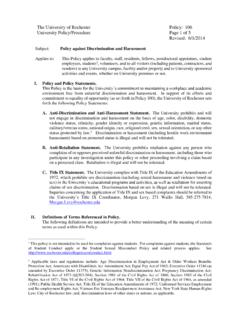Transcription of Title: Theories for Clinical Social Work Practice ...
1 The Social work Podcast Episode 52: Theories for Clinical Social work Practice Page 1 of 15 for Clinical Social Title: Theories for Clinical Social work Practice : Interview with Joseph Walsh, Episode: 52 Date: August 30, 2009 Duration: 47:26 URL: for Clinical Social Jonathan Singer: Today s podcast looks at the relationship between theory and Clinical Social work Practice . I spoke with Joe Walsh, professor of Social work at Virginia Commonwealth University (VCU), and author of the Brooks/Cole text, Theories for Direct Social work Practice , which came out in a second edition in 2009. We talked about why Social workers should learn Practice Theories , the differences between Practice , developmental and personality Theories , the difference between a theory and a model, and why there are so many different Practice Theories .
2 We talked about how knowing theory makes for better Social work Practice and how being "eclectic" isn't about eschewing theory, but being well grounded in a few Theories and making intentional choices about when and how to draw from them. Joe suggested that Social workers in the field can contribute to theory refinement by thinking seriously about how well the Theories they use work with the clients they serve. We ended our conversation with some information on resources for Social workers who are interested in learning more about Practice Theories . Now if you are a regular listener to the podcast, you ll know that at this point I usually say, and now on to the podcast with and I name the guest and the topic. But, before we get to the interview, I wanted to acknowledge that theory is one of those topics that really makes a lot of people uncomfortable.
3 It tends to make Social work students groan, makes practitioners throw up their hands and shrug, and incites all sorts of debate among Social work scholars. I think it is because while theory is by definition abstract, there is a debate in Social work as to whether or not theory improves the quality of Practice , research and policy. I also want to acknowledge that the topic of theory is huge and this podcast cannot cover all of it. But, in order to provide a context for the interview, I m going to spend a few minutes defining some basic ideas around theory, identify different types of Theories , and talk about some of the pros and cons of theory in Social work Practice , research and policy. A definition of theory In a 2001 article, Bruce Thyer, one of Social work s most outspoken critics of theory, defined theory as attempts to retrospectively explain and to prospectively predict (2001, p.)
4 16). This is just one of many definitions, but I like it because it suggests two functions of theory. The first is to explain or help us understand to provide some insight into why something happened. For example, you are working with a woman whose children were removed by child welfare for neglectful parenting. Why did this happen? During your conversation with her it becomes clear that she learned how to parent by watching her parents as well as the people around her. Is that information important? It is according to Albert Bandura s Social Learning Theory, which says that people learn behaviors by watching others. This mother modeled her parenting on what she saw around her. This brings us to the second function of theory to The Social work Podcast Episode 52: Theories for Clinical Social work Practice Page 2 of 15 for Clinical Social predict what might happen in the future.
5 Taking this same example, Social learning theory would predict that if you model protective parenting behaviors, your client will learn how to parent her children in ways that are neither abusive nor neglectful. But, you might be asking yourself, isn t there more to parenting than just behaviors? Yes. And this suggests the limits of relying on a single theory to try to explain or predict human behavior. While some Theories do a better job of explaining and some do a better job of predicting, all Theories have limitations. And being an informed consumer of Theories means knowing about different types of Theories and specifically about different assumptions of Practice Theories . So, let s talk for a minute about the different types of Theories . Types of Theories There are many types of Theories that clinicians need to know about, such as developmental, personality, and Practice theory.
6 Social work students learn about developmental theory in their Human Behavior and Social Environment courses. Some examples of developmental theory are Piaget s theory of cognitive development, Kohlberg and Gilligan s Theories of moral development, and Erik Erickson s psychosocial theory. Developmental Theories can be useful in understanding why someone is doing something at a particular stage in life. Personality Theories explain human behavior in terms of personality traits, such as being more introverted or extroverted, or more dominant or submissive. But neither developmental theory nor personality theory talk much about what you, the practitioner, can do to help. That s where Practice Theories come in. Practice Theories often incorporate components of developmental and personality theory, but the focus is on why someone is having a specific set of problems and how we can resolve those problems.
7 The why and how vary by the Practice theory. Practice Theories are often divided into four broad categories, psychodynamic, cognitive behavioral, humanistic, and postmodern. If I recorded this podcast in the 1950s not only would I be a technological genius, but I would talk exclusively about the variations of Freudian psychosexual theory. By the 1970s, Social workers could choose between psychodynamic, cognitive behavior and humanistic Theories . In the 1980s, postmodern Theories became popular. These categories are not exhaustive, but do account for most Practice Theories that are commonly applied to treating individuals. I m going to spend a few minute describing each of these four categories of Practice Theories . To learn more about these categories, you can listen to a number of other Social work podcasts, or read Social work Practice theory texts by Coady and Lehman, Malcolm Payne, or today s guest, Joe Walsh.
8 Psychodynamic theory. These Theories , including drive or id psychology, ego psychology, object relations, and self psychology, have their roots in the work of Sigmund Freud and the belief that current problems can be traced back to childhood traumas or developmental challenges. These Theories emphasize insight and personality change. More recent psychodynamic approaches, such as brief psychodynamic therapy maintain the emphasis on insight but focus interpretations on current issues. Cognitive behavioral Theories . Although they developed separately, cognitive and behavioral Theories are generally considered part of the same broad category because, in Practice , most behavioral interventions have a cognitive component, and most cognitive interventions have a behavioral component. In contrast to psychodynamic theory s focus on the past, cognitive behavior Theories focus on the present in order to change future behavior.
9 The Social work Podcast Episode 52: Theories for Clinical Social work Practice Page 3 of 15 for Clinical Social However, CBTs acknowledge that current problems with behavior and thinking often have roots in the past. Although today s cognitive behavior therapists agree that the therapeutic relationship is central to the change process, the original writings of Albert Ellis and Aaron Beck described the therapeutic relationship as more of a teacher student relationship the therapist was teaching the client about their patterns of thinking and behavior. Humanistic. This category of Practice Theories has its roots in the work of Carl Rogers, who held the humanistic belief that people have within them all of the resources needed to achieve their full potential. Humanistic therapies see the therapeutic relationship as central to the change process.
10 Rogers is famous for saying that in order for change to occur, therapists must be authentic, genuine, and demonstrate unconditional positive regard for their clients. Humanistic therapies focus on the present, with little emphasis on the past or future. Postmodern. Practice Theories in this category, most notably Michael White and David Epston s Narrative Therapy, are critical of approaches that privilege some ideas at the expense of others. Postmodernists believe that since reality is a Social construction, the therapeutic relationship is central to change. Postmodern approaches argue that the primary benefit of labeling a set of behaviors as dysfunctional is to elevate those without that label. In this way, traditional Social services, the medical model, and most treatment approaches are tools used by those in power to maintain control.







